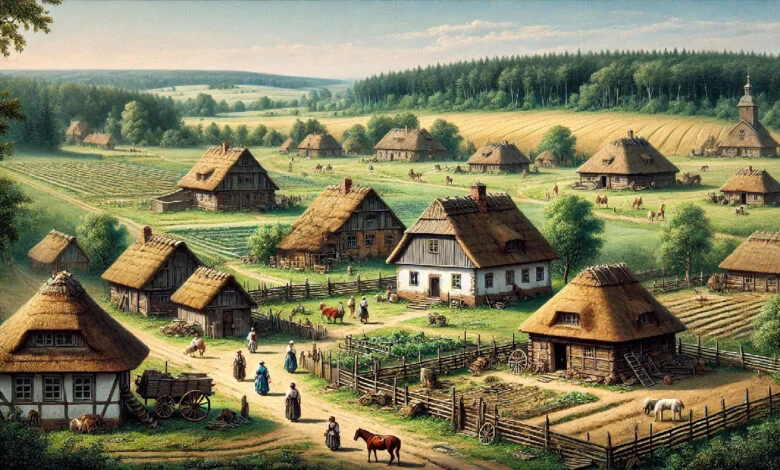Introduction to Michael Quandt Born Wurchow Pommern
Nestled in the heart of Pommern lies a story waiting to be uncovered: that of Michael Quandt Born Wurchow Pommern during the 18th century. This period was marked by profound changes, but also rich traditions and vibrant rural life. Exploring Michael’s journey offers us a unique glimpse into an era where community bonds were strong, agriculture defined livelihoods, and local customs shaped daily existence.
As we dive into the world of Michael Quandt, we’ll unravel not just his personal history but also how it reflects broader societal trends of his time. From family life to farming practices and cultural beliefs—each facet paints a vivid picture of what it meant to live in rural Pommern over two hundred years ago. Join me as we embark on this historical adventure filled with insights that resonate even today!
The Life and Times of 18th Century Rural Pommern
The 18th century was a vibrant period for rural Pommern, marked by agricultural innovation and community life. Villages were often small, with families working together to cultivate the land.
Life revolved around the seasons. Spring brought planting, while summer was filled with harvesting and celebrations. The rhythm of everyday tasks created a strong sense of belonging among villagers.
Local markets bustled as neighbors exchanged goods. Craftsmanship thrived alongside farming; artisans produced textiles and pottery that reflected local traditions.
Social gatherings played an important role in maintaining bonds within the community. Festivals celebrated harvests or seasonal changes, where laughter echoed through fields and music filled the air.
Despite challenges like harsh winters or crop failures, resilience defined this era. The people of Pommern learned to adapt, drawing strength from each other amidst adversity. Their legacy still resonates today in tales passed down through generations.
Family and Community in Wurchow
Wurchow in the 18th century was a tapestry of close-knit families and vibrant community life. The bonds among residents were strong, shaped by shared experiences and mutual support.
Gatherings played a significant role. Whether it was celebrating harvests or religious festivals, these events fostered unity. Neighbors would come together to share food, stories, and laughter.
Children learned from their parents through hands-on involvement in daily activities. This created a sense of belonging and continuity across generations.
Craftsmanship thrived as families passed down skills like weaving and pottery-making. Each home contributed to Wurchow’s identity, showcasing the talents of its inhabitants.
Conflict did arise occasionally but was usually resolved within the community framework. Trust built over years allowed for open dialogue that eased tensions swiftly.
Such an environment nurtured resilience amid challenges while instilling pride in one’s heritage—a vital part of Michael Quandt’s legacy.
Farming and Agricultural Practices in Pommern
Farming in 18th century Pommern was both a necessity and an art form. The fertile soil of the region allowed families like that of Michael Quandt to cultivate various crops. Wheat, barley, and rye were staples that sustained communities.
Crop rotation played a critical role in maintaining soil health. Farmers carefully planned their planting cycles to ensure productivity year after year. This method not only enriched the land but also reduced pests.
Livestock farming complemented crop production. Cattle, pigs, and chickens provided meat, milk, and eggs—key components of daily diets. Animals also contributed to tilling fields and fertilizing them naturally.
Tools were simple yet effective: wooden plows with iron tips made tilling easier while scythes helped harvest grains swiftly. Despite challenges posed by weather or disease, farmers exhibited resilience through shared knowledge within their community.
Traditions around planting seasons connected generations as they honored the earth’s rhythms together.
Traditional Customs, Beliefs, and Superstitions
In 18th century Pommern, traditional customs shaped daily life. Festivities were rich with local flavor and deep-rooted meaning.
Seasonal celebrations marked the agricultural calendar. Harvest festivals brought communities together, filled with music, dancing, and feasting. These gatherings reinforced bonds among families and neighbors.
Beliefs in folklore influenced behavior. Many people adhered to superstitions that guided their actions. For instance, certain animals were seen as omens or harbingers of good fortune.
Rituals surrounding births and marriages held special significance too. Families often consulted herbalists for remedies to ensure health and prosperity.
Cultural practices varied from village to village but shared common themes rooted in nature’s cycles. The connection between the land and its inhabitants was palpable through these customs, making them an integral part of rural existence in Wurchow Pommern.
Impact of Historical Events on Michael Quandt’s Life
The life of Michael Quandt was undoubtedly shaped by the historical events occurring around him in 18th century Pommern. This period was defined by political shifts, wars, and social changes that profoundly affected rural communities.
The aftermath of the Great Northern War left many areas devastated. Resources dwindled, and families struggled to maintain their livelihoods. For a farmer like Quandt, these challenges meant adapting quickly to survive harsh conditions.
Moreover, the rise of Prussian authority brought new regulations affecting land ownership and agricultural practices. Michael had to navigate this shifting landscape while trying to preserve his family’s legacy.
Social upheaval also played a role in shaping relationships within Wurchow. As neighboring villages merged or fell apart due to economic pressures, community ties were tested yet remained resilient. Through it all, Quandt’s experiences reflected broader themes of perseverance amidst uncertainty in an ever-changing world.
Preserving the Legacy: Descendants of Michael Quandt Today
The legacy of Michael Quandt is alive and well through his descendants. They carry not just the name, but the rich stories of their ancestor’s life in Wurchow Pommern.
Many of them take pride in researching family history, eager to uncover connections to the past. This journey often leads them back to 18th-century rural traditions that shaped their heritage.
Some descendants are actively involved in local historical societies. They participate in events that celebrate their ancestry while fostering community spirit.
Through storytelling, they keep Michael’s experiences alive, passing down knowledge about farming practices and customs rooted in their family tree.
Interest in genealogy has surged lately among younger generations, as they seek a deeper understanding of where they come from. Their efforts ensure that the essence of Michael Quandt’s life continues to be felt today.
Conclusion: Lessons from the Past for
The life of Michael Quandt in Wurchow Pommern serves as a profound reminder of the resilience and adaptability inherent in rural communities. His experiences highlight the importance of family ties and communal support, which remain relevant today.
Understanding agricultural practices from that era sheds light on sustainable methods that modern farmers can learn from. These traditions emphasize harmony with nature, a lesson we must heed amidst contemporary challenges.
Moreover, exploring customs and superstitions reveals how culture shapes identity. Such insights encourage us to honor our roots while forging ahead.
As today’s descendants reflect on their heritage, they connect with stories that enrich their lives. Learning from past struggles fosters appreciation for present comforts and inspires future generations to cherish community values. This legacy beckons us all to embrace history’s lessons as we navigate an ever-changing world.
FAQs
Exploring the Legacy of Michael Quandt Born Wurchow Pommern: Insights Into 18th Century Rural Life
Introduction to Michael Quandt Born Wurchow Pommern
Michael Quandt, born in the small village of Wurchow, Pommern, offers a captivating glimpse into 18th-century rural life. His stories and experiences reflect a time when communities were tightly knit and survival depended heavily on agriculture and tradition. This blog post will delve into his life and explore what it meant to live in this unique region during that era.
The Life and Times of 18th Century Rural Pommern
Living in 18th-century Pommern was both challenging and enriching. The landscape was dotted with farms, where families worked tirelessly from dawn till dusk. Despite hardships like crop failures or harsh winters, there was an underlying resilience among the people. They built their lives around farming cycles while cherishing festivals that marked seasonal changes.
Family and Community in Wurchow
In Wurchow, family ties ran deep. Extended families often lived together or nearby, fostering strong bonds essential for support during tough times. Neighbors relied on each other not just for friendship but also for labor during harvest seasons or building projects. These connections created a sense of belonging that defined life in rural communities.
Farming and Agricultural Practices in Pommern
Farming techniques were rudimentary yet effective given the limited technology available at the time. Crop rotation was common practice to maximize yield while minimizing soil depletion. Livestock played a significant role as well—providing meat, dairy products, leather goods, and even fertilizer for crops.
Traditional Customs, Beliefs, and Superstitions
Tradition held great importance within these communities; customs revolved around agricultural rituals as well as religious observances intertwined with local folklore. Many believed strongly in superstitions governing planting times or weather predictions—even today some remnants persist within descendants’ practices.
Impact of Historical Events on Michael Quandt’s Life
Historical events shaped many lives—including that of











